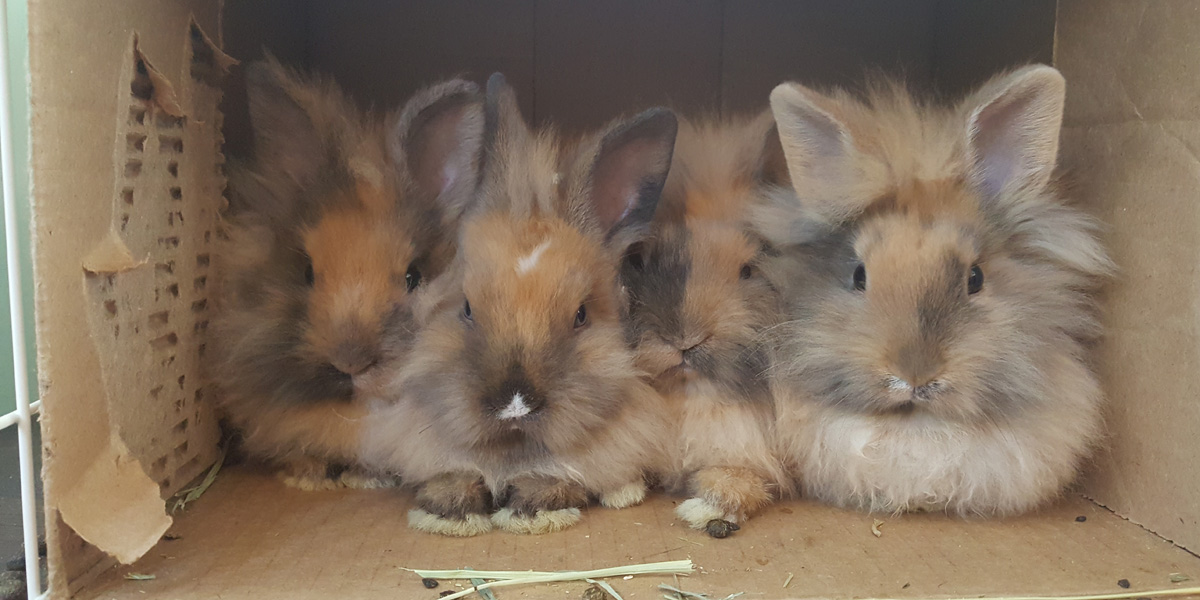
Foster Home Agreement for Triangle Rabbits
Thank you for your interest in volunteering to become a foster family! Please read over this page, which outlines expectations for foster homes and for the adopting organization. Foster families agree to uphold these guidelines, and agree to the release of liability, as part of their volunteer work.
Foster homes provide a safe, loving, temporary home. Foster families care for foster rabbit(s) as if they were their own. Foster homes are responsible for the safety of each foster rabbit(s) that comes into their care, and for the safety of other pets and people the foster rabbit(s) comes into contact with. Foster homes agree that the adopting organization is authorized to remove foster rabbit(s) if the rabbit(s) is not receiving adequate home care or is being endangered by lack of veterinary care, or if there has been a violation of any local anti-cruelty laws.
Foster homes provide a nutritious diet. Foster families provide fresh water, limited, high-quality timothy pellets (no seeds or nuts), unlimited grass hay, and a daily salad consisting of mixed fresh greens. Triangle Rabbits is a federally recognized, tax-exempt organization, and supplies provided by the foster home are tax deductible.
Foster homes provide a roomy living space inside the house. An indoor enclosure at least 10 square feet is required for bunny housing, which can be an exercise pen, an extra large dog crate, or another enclosure of appropriate size. The space should contain the rabbit’s litter box, hide box, food and water bowls and an assortment of toys (boxes, baskets, etc.) for them to play with. Bonded pairs and large breed rabbits require additional space.
Foster homes provide time for exercise. Foster homes allow time for exercise each day (unless otherwise directed by a veterinarian) in a bunny-proofed area.
Foster homes supervise interaction. Foster homes supervise any members and guests of the household, including any children, when interacting with foster rabbit(s). Foster homes agree that foster rabbit(s) may never be left unattended with other pets in the home, and agree to supervise foster rabbit(s) closely.
Foster homes help with behaviors. Foster homes agree to work with foster rabbit(s) and with the adopting organization to overcome any behavioral issues that might arise with him/her so he/she can be adopted into a loving home..
Foster homes provide transport for medical care. All basic medical expenses for each foster rabbit(s) will be covered by Triangle Rabbits, provided that an authorized representative has approved the medical expenses, and the care is from a designated veterinarian. Foster homes agree to notify Triangle Rabbits promptly if a foster rabbit(s) is in need of medical care. Foster homes understand that unauthorized care may not be approved and may come out of pocket.
Foster homes agree to return borrowed items. Triangle Rabbits will offer donated items (food, hay, carrier, x-pen), as available for use by foster homes (general expenses, if paid for by a foster home, are tax deductible). Enclosures and litter boxes may be lent to foster homes, and foster homes agree to return items at the end of the foster period.
Foster homes agree that potential adopters must be screened by the adopting organization. Any potential adopters MUST complete the adoption application for the adopting organization. Foster homes agree that the final decision to place or not to place any particular rabbit with any particular potential adopter will be made by the adopting organization. If prospective adopters contact foster homes directly, they can be directed to the adopting organization for more information. Foster homes understand that if they decide to adopt a foster rabbit(s) in their care, they must go through the adoption process.
Foster homes participate in adoption calls. Adoption calls are currently taking place over video chat. Foster families agree to participate in video chats with adopting families so they can learn more about the rabbit(s).
Foster homes agree to bring the rabbit(s) to an approved location for care and/or adoption. Foster families agree to bring the rabbit(s) to an approved location, or to another volunteer, for meet and greet appointments, special needs care, or for any other purpose related to their care and adoption. When the rabbit(s) is ready for adoption, foster families agree to bring the rabbit(s) to an approved location for transfer to the adopting family.
Foster homes agree to provide notice if they need to stop fostering during a volunteer commitment. Forewarning is necessary to have time to locate a new foster home placement for the rabbit. Foster homes agree to provide at least one week's notice except in the case of an emergency.
Foster homes agree that Triangle Rabbits and its representatives are not liable or responsible for any damage or injury caused by the foster rabbit(s). Foster homes understand that working with animals carries a risk of injury, and that health problems may arise in the future for which the above-named organization or its representatives will not be held responsible. Foster homes agree to release and hold harmless from liability Triangle Rabbits, and all third‐party participants, should anyone become sick or injured as the result of their volunteer work.
An important note about RHDV2. Prospective volunteers and foster homes moving to NC from a state where RHDV2 is present must wait a minimum of three months before applying to volunteer or foster. To learn more about RHDV2 visit the House Rabbit Society's RHDV2 Resource Page.
Foster homes provide a nutritious diet. Foster families provide fresh water, limited, high-quality timothy pellets (no seeds or nuts), unlimited grass hay, and a daily salad consisting of mixed fresh greens. Triangle Rabbits is a federally recognized, tax-exempt organization, and supplies provided by the foster home are tax deductible.
Foster homes provide a roomy living space inside the house. An indoor enclosure at least 10 square feet is required for bunny housing, which can be an exercise pen, an extra large dog crate, or another enclosure of appropriate size. The space should contain the rabbit’s litter box, hide box, food and water bowls and an assortment of toys (boxes, baskets, etc.) for them to play with. Bonded pairs and large breed rabbits require additional space.
Foster homes provide time for exercise. Foster homes allow time for exercise each day (unless otherwise directed by a veterinarian) in a bunny-proofed area.
Foster homes supervise interaction. Foster homes supervise any members and guests of the household, including any children, when interacting with foster rabbit(s). Foster homes agree that foster rabbit(s) may never be left unattended with other pets in the home, and agree to supervise foster rabbit(s) closely.
Foster homes help with behaviors. Foster homes agree to work with foster rabbit(s) and with the adopting organization to overcome any behavioral issues that might arise with him/her so he/she can be adopted into a loving home..
Foster homes provide transport for medical care. All basic medical expenses for each foster rabbit(s) will be covered by Triangle Rabbits, provided that an authorized representative has approved the medical expenses, and the care is from a designated veterinarian. Foster homes agree to notify Triangle Rabbits promptly if a foster rabbit(s) is in need of medical care. Foster homes understand that unauthorized care may not be approved and may come out of pocket.
Foster homes agree to return borrowed items. Triangle Rabbits will offer donated items (food, hay, carrier, x-pen), as available for use by foster homes (general expenses, if paid for by a foster home, are tax deductible). Enclosures and litter boxes may be lent to foster homes, and foster homes agree to return items at the end of the foster period.
Foster homes agree that potential adopters must be screened by the adopting organization. Any potential adopters MUST complete the adoption application for the adopting organization. Foster homes agree that the final decision to place or not to place any particular rabbit with any particular potential adopter will be made by the adopting organization. If prospective adopters contact foster homes directly, they can be directed to the adopting organization for more information. Foster homes understand that if they decide to adopt a foster rabbit(s) in their care, they must go through the adoption process.
Foster homes participate in adoption calls. Adoption calls are currently taking place over video chat. Foster families agree to participate in video chats with adopting families so they can learn more about the rabbit(s).
Foster homes agree to bring the rabbit(s) to an approved location for care and/or adoption. Foster families agree to bring the rabbit(s) to an approved location, or to another volunteer, for meet and greet appointments, special needs care, or for any other purpose related to their care and adoption. When the rabbit(s) is ready for adoption, foster families agree to bring the rabbit(s) to an approved location for transfer to the adopting family.
Foster homes agree to provide notice if they need to stop fostering during a volunteer commitment. Forewarning is necessary to have time to locate a new foster home placement for the rabbit. Foster homes agree to provide at least one week's notice except in the case of an emergency.
Foster homes agree that Triangle Rabbits and its representatives are not liable or responsible for any damage or injury caused by the foster rabbit(s). Foster homes understand that working with animals carries a risk of injury, and that health problems may arise in the future for which the above-named organization or its representatives will not be held responsible. Foster homes agree to release and hold harmless from liability Triangle Rabbits, and all third‐party participants, should anyone become sick or injured as the result of their volunteer work.
An important note about RHDV2. Prospective volunteers and foster homes moving to NC from a state where RHDV2 is present must wait a minimum of three months before applying to volunteer or foster. To learn more about RHDV2 visit the House Rabbit Society's RHDV2 Resource Page.

